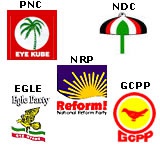
Monsignor Anthony Kornu, Volta Regional Chairman of the Political Parties Code of Conduct Enforcement Committee, has asked Ghanaians to study the document to enable them to hold political parties accountable to its violations.
The code is a set of rules imposed by political parties on themselves, under the aegis of the Institute of Economic Affairs (IEA), to ensure peaceful elections.
Monsignor Kornu, said often political parties made fine rules for themselves, but disregard them, necessitating civil society interest to hold political parties to their commitments.
He was speaking at an awareness creation campaign on the 2012 Code of Conduct, held in Ho on Monday, by the IEA under its Ghana Political Parties Programme.
The 23-page document that has a preamble, part of which reads “the roots of a thriving democracy are to be found in peace stability, law and order as well as compliance by all stakeholders with well-defined electoral laws and codes,” has been authenticated by all political parties.
Mrs. Hilary Gbedemah, a legal officer, associated with the programme, said Ghana had run its multi-party democracy successfully since 1993 but still had critical challenges to contend with as another election draws near.
She said electoral related violence in Zimbabwe, Kenya, Guinea Bissau, Cote d’Ivoire and Nigeria in recent times should represent enough hindsight to guide Ghana.
Mrs. Gbedemah listed instances that “give us concern about the forthcoming elections as hate speeches, use of unsavoury language and some occurrences during the Biometric Voter Registration.”
She observed that with 81 days to go to the polls, “the main political parties are already firing on all cylinders and indications are that the 2012 general elections are going to be real test of the good health of our democracy”.
Mrs. Gbedemah said the 2012 code was an improvement on those of 2004 and 2008 to “give teeth to” to the enforcement mechanism.
She said this time round the National Enforcement Body through to the Regional Enforcement bodies could impose sanctions and “where offences committed are found to be severe, a report will be made to the Security Agencies for the appropriate action to be taken”.
The Code has rules governing campaigning, out of campaign activities, elections, activities after the declaration of results, enforcement and implementation.
Togbe Kwaku Ayim IV. Paramount Chief of the Ziavi Traditional Area, expressed worry about the inability of the Information Services Department to educate the public through outdoor films on election violence in other countries as guide for Ghanaians.